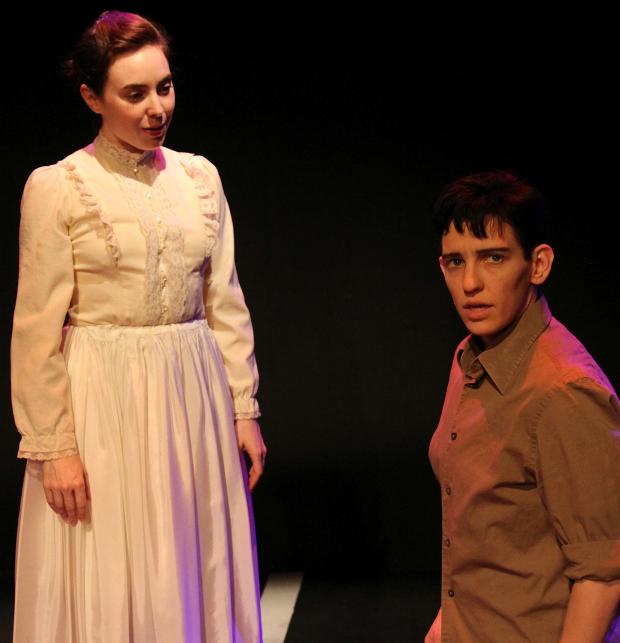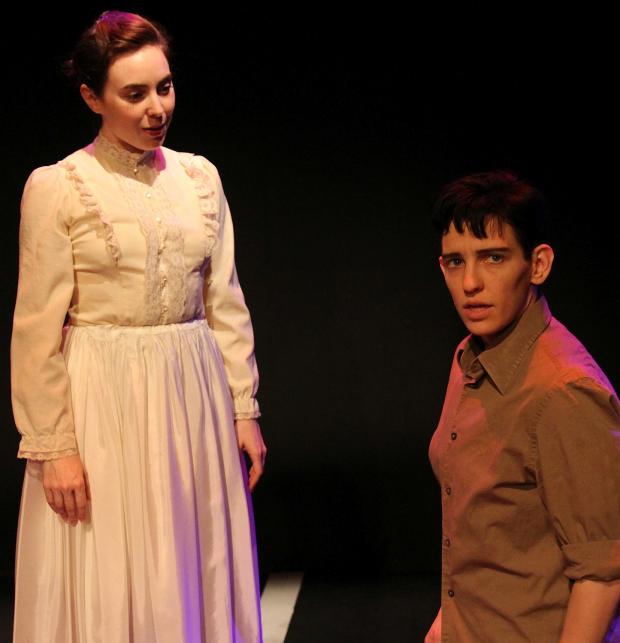Naomi Wallace’s genre (and gender) blending Slaughter City is a cross between a Clifford Odets type of play about the working class and a Rod Serling TV episode set in “a fifth dimension beyond that which is known to man… as vast as space and as timeless as infinity… the middle ground between light and shadow, between science and superstition, and it lies between the pit of man's fears and the summit of his knowledge… the dimension of imagination.”
Indeed, imagine Waiting for Lefty combined with the Twilight Zone and you’ll get a sense of this two-acter presented by the Coeurage Theatre Company. Slaughter City takes place (mostly) circa 1991 in a meat packing plant. In its depiction of and concern for assembly line workers and union issues, Slaughter is in the vein of the Proletarian Dramas by people’s playwrights such as Odets, John Howard Lawson, Marc Blitzstein and Bertolt Brecht. Slaughter’s dialogue refers to the Industrial Workers of the World, scabs, the horrendous 1911 Triangle Shirtwaist Factory fire, strikes and other blue collar subjects Joe Hill, Paul Robeson or Woody Guthrie might have sung ballads about.
But this is 2018 and perhaps in an effort to keep her play current and interesting for contemporary auds, Wallace has injected 21st century hot button topics: A transgender character (see if you can guess who he/she is?); lesbianism; interracial romance; sexual harassment on the job a la the #MeToo movement; patriarchy; and but of course America’s original (and in the case of the Natives, aboriginal) sin: Racism. In addition to Slaughter’s content Wallace has sought a form that’s a hybrid of the type of the nitty-gritty realism of those British “Kitchen Sink” and Odets’ blue collar productions, with stylized, sometimes cinematic techniques and a supernatural panache. (From time to time a trio of dancers, including Donna Eshelman - who also choreographed the show - plus a recorded soundtrack, with Joseph V. Calarco’s sound design, enhance the onstage action.)
As Sausage Man, veteran thesp Ted Barton seems to be an über-capitalist traveling through time and space, a sort of His Satanic Majesty of the class war. Representing capital, the goateed, balding Sausage Man is a real pig (although he unfortunately looks a bit like Lenin - Vlad, not John). Ilia Volok as the duplicitous, cruel, harassing Baquin (a reference to “bacon”?) symbolizes management. Although given today’s context of ruthless oppression of refugees and immigrants by the Trump regime, it seems miscast to have a factory manager in a position of authority speak in a foreign accent. Although Volok acquits himself well in the role, this seems a bit tone deaf as “foreigners” are currently the underdogs being besieged right now.
I am aware that pigs do come in all colors and their squeals can have various accents and be in different languages. Baquin’s underling, Tuck, is Black, but with his nuanced performance, Eric Ruff delivers what may be Slaughter’s best acting. What Ruff conveyed to me is the anguish of a man caught in the middle: Tuck is an African American existing in racist America who makes a conscientious effort to find his way in a white supremacist society. He walks a tightrope, trying to earn his position in middle management, and reminds Baquin that he does not have his post through affirmative action but on his own merit (unlike, say, colossal oinkers like the Trumps who were born into privilege). But probably because he comes from the grass roots, Tuck still has a conscience and doesn’t endorse the meat packing plant’s more egregious, oppressive measures. Bravo to Ruff for his subtle rendering of a man trying to earn a decent living but trapped between capital/management and labor - he delivers one of the finest characterizations currently on the boards here in L.A.
On the labor side, Tarina Pouncy as the unfortunately named factory worker Roach is another standout. Racism and sexism add to the repertoire of exploitation this 1990s “Rosie the Riveter” must contend with. Elspeth Weingarten cleverly plays a key role as Cod, whose transitions are pivotal plot points in Slaughter. The cast is well-helmed by director Jer Adrianne Lelliott, the founding artistic director of Coeurage Theatre Company.
This proletarian drama has a vibe similar to HBO’s Westworld series - although its flesh and blood assembly line laborers are no androids, they are indeed all-too-human. Call it “Workerworld.” Although Act I is too long and needs to be shortened by about half an hour in order to focus this unusual, complex story, Wallace is to be commended for striving to bring the theme of class struggle into a 21st context.
And so is the Coeurage Theatre Company, which has a laudable pay-what-you-want policy intended to make the live stage available to all. In particular, for the more adventurous theatergoer, who prefers his/ her productions to be thought provoking, such as Coeurage’s 2017 mounting of Lauren Gunderson’s Emilie: La Marquise du Châtelet Defends Her Life Tonight, about a real life 18th century married female scientist who had an open affair with the Enlightenment thinker Voltaire. Pay what you will at its shows, but give credit where it’s due: With its off-the-beaten-track look at the plight of the working class, Slaughter City proves once again that Coeurage Theatre Company earns its “union dues.” Ticket buyers and workers of the world, unite!
Slaughter City plays Thursdays, Fridays and Saturdays at 8:00 p.m. through July 14 (Bastille Day!) at the Historic Lankershim Arts Center (which features an art gallery as well as an upstairs theater space), 5108 Lankershim Boulevard, North Hollywood, CA 91601. Info:
www.coeurage.org/slaughtercity; (323)944-2165.
L.A.-based reviewer/historian Ed Rampell is co-presenting a Paul Robeson birthday celebration with re-enactor K.B. Solomon on June 28 as part of the “Marx @ 200: The Marxist Movie Series” (see: https://www.gofundme.com/marx-200-the-marxist-movie-serie). The third edition of “The Hawaii Movie and Television Book” co-authored by Rampell is now available at: https://mutualpublishing.com/product/the-hawaii-movie-and-television-book/ .


